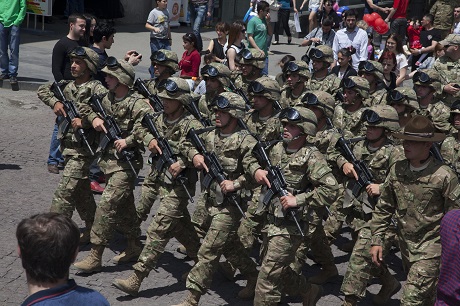Georgia will not increase size of its Armed Forces in 2016

Georgia will not increase the capacity of its Armed Forces for 2016. That was one of the outcomes of the National Security Council (NSC) meeting at the President’s palace in Avlabari yesterday.
The NSC, which unites representatives of the legislative, executive and judicial branches of Government, discussed three major topics; the number of servicemen within the Georgian Armed Forces (GAF) for 2016; military infrastructure development and the 2015-2018 assessment of security threats for Georgia, NSC secretary Irine Imerlishvili said.

President of Georgia Giorgi Margvelashvili called the National Security Council meeting yesterday. Photo by the President’s webpage.
The meeting lasted a long time and we discussed issues relating to security threats in detail,” Imerlishvili said.
The President’s Security Council worked on the ‘Threat Assessment Document of Georgia’ that should cover the three year period from 2015 to2018 and then the document will be sent to the Government to be confirmed,” she added.
The confidential document must first be approved by the Georgian Government before being sent to Parliament for final confirmation.
Georgia’s Parliament Speaker David Usupashvili, who attended the meeting, said that the gathering was very important. He added the Prime Minister should also participate in these meetings.
President Giorgi Margvelashvili stressed NSC meetings were "essential” and he spoke about the importance of increasing the number of NSC meeting participants.
The NSC is an advisory body led by the President of Georgia that is empowered to consider issues determined by the Organic Law on National Security Council of Georgia to draft highest political decisions.
Statutory members of the NSC are:
- The Prime Minister;
- Speaker of the Parliament of Georgia;
- Minister of Foreign Affairs of Georgia;
- Minister of Defence of Georgia;
- Minister of Internal Affairs of Georgia;
- Chairman of the Defence and Security Committee of the Parliament of Georgia;
- Chairman of the Foreign Relations Committee of the Parliament of Georgia;
- Assistant to the President of Georgia on National Security Issues - Secretary of the National Security Council; and
- Chief of General Staff of the Georgian Armed Forces.
NSC meetings are presided by the President of Georgia. President Margvelashvili has the right to invite other participants to attend a NSC meeting.
 Tweet
Tweet  Share
Share